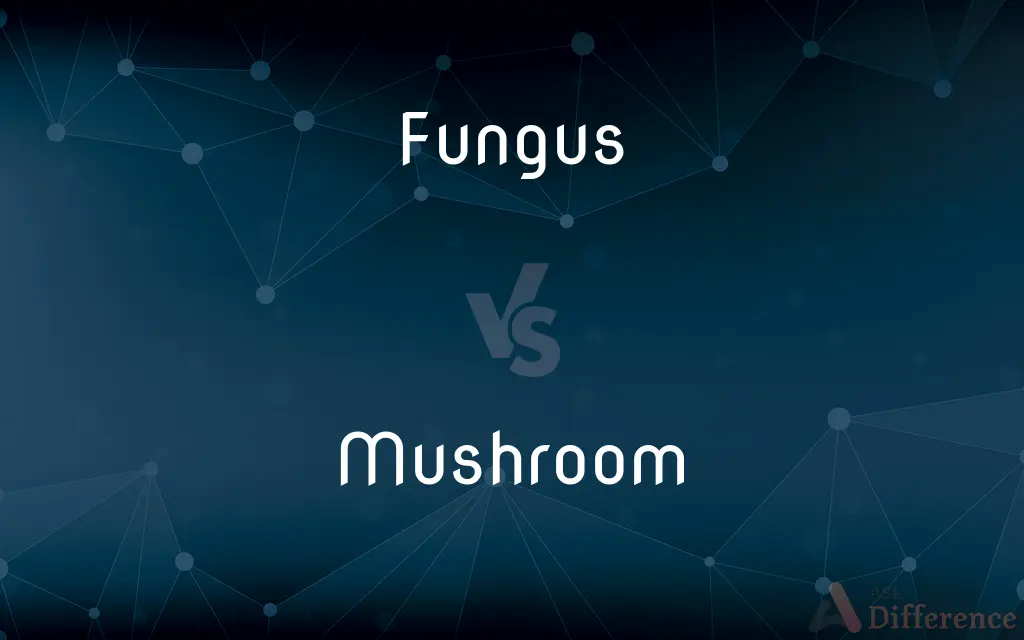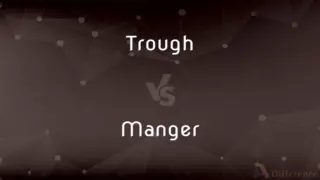Fungus vs. Mushroom — What's the Difference?
Edited by Tayyaba Rehman — By Fiza Rafique — Updated on November 3, 2023
Fungus is a kingdom of spore-producing organisms that feed on organic matter, including molds, yeast, and mushrooms. Mushroom is the fruiting body of certain fungi, visible above ground and often edible.

Difference Between Fungus and Mushroom
Table of Contents
ADVERTISEMENT
Key Differences
Fungi are a vast and diverse kingdom of organisms that exist in many forms, ranging from microscopic yeasts to large mushrooms. Mushrooms, on the other hand, are just a visible part of certain fungi, specifically the reproductive structure that grows above ground.
While all mushrooms are fungi, not all fungi are mushrooms. Fungi can exist as mold, yeast, or even larger structures like bracket fungi, which are not classified as mushrooms. Mushrooms represent a reproductive stage when the fungus produces spores.
Fungi play a crucial ecological role as decomposers, breaking down organic material and recycling nutrients. Mushrooms, when they appear, are a sign that the fungus is ready to reproduce, often occurring after rain or in moist conditions.
The study of fungi is known as mycology, and it encompasses the study of mushrooms as well. However, the study of mushrooms specifically is often referred to as mushroom hunting or mushroom identification, which is a subset of mycology.
Many fungi form symbiotic relationships with plants, aiding in nutrient absorption. Mushrooms can also form these relationships but are also sought after for culinary and medicinal purposes, highlighting their unique role in both ecosystems and human culture.
ADVERTISEMENT
Comparison Chart
Kingdom
Part of the Fungi kingdom.
A type of Fungi.
Definition
Includes all types of fungi.
Refers to the fruiting body of certain fungi.
Varieties
Molds, yeasts, mushrooms, and more.
Varieties include button, portobello, shiitake, etc.
Visibility
Many are microscopic or hidden.
Visible and identifiable structures.
Purpose
Decomposition, symbiosis, infection.
Spore dispersion, sometimes edible.
Compare with Definitions
Fungus
A spore-producing organism.
The damp bathroom walls were covered in fungus.
Mushroom
Often edible and used in cooking.
She sliced the mushroom for her stir-fry recipe.
Fungus
A member of the Fungi kingdom.
A fungus infected the crops, causing widespread damage.
Mushroom
Can be wild or cultivated.
He foraged for wild mushrooms in the forest.
Fungus
An organism that feeds on organic matter.
Fungus plays an important role in decomposing fallen leaves.
Mushroom
Varies in shape, size, and color.
The mushroom had a bright red cap with white spots.
Fungus
Includes yeasts, molds, and mushrooms.
Brewers use a type of fungus, yeast, to ferment beer.
Mushroom
A mushroom or toadstool is the fleshy, spore-bearing fruiting body of a fungus, typically produced above ground, on soil, or on its food source. The standard for the name "mushroom" is the cultivated white button mushroom, Agaricus bisporus; hence the word "mushroom" is most often applied to those fungi (Basidiomycota, Agaricomycetes) that have a stem (stipe), a cap (pileus), and gills (lamellae, sing.
Fungus
Can be symbiotic or pathogenic.
The fungus on the tree roots helped the tree absorb minerals.
Mushroom
Any of various fungi that produce a fleshy fruiting body, especially one consisting of a stalk with an umbrella-shaped cap.
Fungus
A fungus (plural: fungi or funguses) is any member of the group of eukaryotic organisms that includes microorganisms such as yeasts and molds, as well as the more familiar mushrooms. These organisms are classified as a kingdom, separately from the other eukaryotic kingdoms, those being Plantae, Animalia, Protozoa, and Chromista.
Mushroom
Any of such fungi that are edible, especially the widely cultivated species Agaricus bisporus, which includes the button, cremini, and portobello mushrooms.
Fungus
Any of numerous spore-producing eukaryotic organisms of the kingdom Fungi, which lack chlorophyll and vascular tissue and range in form from a single cell to a mass of branched filamentous hyphae that often produce specialized fruiting bodies. The kingdom includes the yeasts, smuts, rusts, mushrooms, and many molds, excluding the slime molds and the water molds.
Mushroom
The usually aboveground fruiting body of any of such fungi.
Fungus
(mycology) Any member of the kingdom Fungi; a eukaryotic organism typically having chitin cell walls but no chlorophyll or plastids. Fungi may be unicellular or multicellular.
Mushroom
One of these fruiting bodies that produce hallucinations when ingested. Also called magic mushroom.
Fungus
A spongy, abnormal excrescence, such as excessive granulation tissue formed in a wound.
Mushroom
Something shaped like one of these fungi.
Fungus
Any one of the Fungi, a large and very complex group of thallophytes of low organization, - the molds, mildews, rusts, smuts, mushrooms, toadstools, puff balls, and the allies of each. See fungi.
Mushroom
To multiply, grow, or expand rapidly
The population mushroomed in the postwar decades.
Fungus
A spongy, morbid growth or granulation in animal bodies, as the proud flesh of wounds.
Mushroom
To swell or spread out into a shape similar to a mushroom.
Fungus
A parasitic plant lacking chlorophyll and leaves and true stems and roots and reproducing by spores
Mushroom
To collect wild mushrooms.
Mushroom
Relating to, consisting of, or containing mushrooms
Mushroom sauce.
Mushroom
Resembling mushrooms in rapidity of growth or evanescence
Mushroom towns.
Mushroom
Any of the fleshy fruiting bodies of fungi typically produced above ground on soil or on their food sources (such as decaying wood).
Some mushrooms are edible and taste good, while others are poisonous and taste foul.
Mushroom
A fungus producing such fruiting bodies.
Mushroom
Champignon or Agaricus bisporus, the mushroom species most commonly used in cooking.
Mushroom
Any of the mushroom-shaped pegs in bar billiards.
Mushroom
(architecture) A concrete column with a thickened portion at the top, used to support a slab.
Mushroom
One who rises suddenly from a low condition in life; an upstart.
Mushroom
(figurative) Something that grows very quickly or seems to appear suddenly.
Mushroom
Ellipsis of mushroom cloud
Mushroom
Having characteristics like those of a mushroom, for example in shape or appearance, speed of growth, or texture.
Mushroom cloud
Mushroom
To grow quickly to a large size.
The town’s population mushroomed from 10,000 to 110,000 in five years.
Mushroom
To gather mushrooms.
We used to go mushrooming in the forest every weekend.
Mushroom
To form the shape of a mushroom.
Mushroom
To form the shape of a mushroom when striking a soft target.
Mushroom
An edible fungus (Agaricus campestris), having a white stalk which bears a convex or oven flattish expanded portion called the pileus. This is whitish and silky or somewhat scaly above, and bears on the under side radiating gills which are at first flesh-colored, but gradually become brown. The plant grows in rich pastures and is proverbial for rapidity of growth and shortness of duration. It has a pleasant smell, and is largely used as food. It is also cultivated from spawn.
Mushroom
One who rises suddenly from a low condition in life; an upstart.
Mushroom
Of or pertaining to mushrooms; as, mushroom catchup.
Mushroom
Resembling mushrooms in rapidity of growth and shortness of duration; short-lived; ephemerial; as, mushroom cities.
Mushroom
To grow or expand rapidly.
Mushroom
To grow so much and so rapidly as to change qualitatively; used with into; as, a minor border skirmish mushroomed into a full-blown war.
Mushroom
Common name for an edible agaric (contrasting with the inedible toadstool)
Mushroom
Any of various fleshy fungi of the subdivision Basidiomycota consisting of a cap at the end of a stem arising from an underground mycelium
Mushroom
A large cloud of rubble and dust shaped like a mushroom and rising into the sky after an explosion (especially of a nuclear bomb)
Mushroom
Fleshy body of any of numerous edible fungi
Mushroom
Pick or gather mushrooms;
We went mushrooming in the Fall
Mushroom
Grow and spread fast;
The problem mushroomed
Mushroom
The fruiting body of a fungus.
Mushrooms popped up overnight in the wet soil.
Mushroom
A reproductive structure producing spores.
The mushroom released its spores into the air.
Common Curiosities
Are all mushrooms edible?
No, while some mushrooms are edible, others are poisonous and can be very dangerous.
What's the difference between fungus and mushrooms?
A fungus can refer to any member of the fungal kingdom, while a mushroom specifically refers to the fruiting body of certain fungi.
What is a mushroom?
A mushroom is the fruiting body of certain types of fungi, often edible and used in cooking.
What is a fungus?
A fungus is a spore-producing organism that belongs to its own kingdom, separate from plants and animals.
Are fungi plants?
No, fungi are not plants; they belong to a separate kingdom of their own.
What is a fungal infection?
A fungal infection occurs when a fungus overgrows in or on the body, like athlete's foot.
Can mushrooms be used medicinally?
Yes, some mushrooms have medicinal properties and are used in traditional and modern medicine.
How does a fungus reproduce?
Many fungi reproduce by releasing spores, which can grow into new organisms.
Do all fungi cause disease?
Not all fungi cause disease; many are beneficial decomposers or have symbiotic relationships with plants.
Can I grow mushrooms at home?
Yes, you can grow certain types of mushrooms at home with the right conditions and equipment.
How do I identify edible mushrooms?
Edible mushrooms should only be identified by an expert due to the risk of poisonous look-alikes.
What environments do fungi prefer?
Fungi typically thrive in moist, dark environments with abundant organic material.
Are mushroom spores visible to the naked eye?
Individual mushroom spores are microscopic and not visible to the naked eye.
What is mycology?
Mycology is the scientific study of fungi, including mushrooms.
How do fungi affect the ecosystem?
Fungi play a critical role in ecosystems by decomposing organic matter and cycling nutrients.
Share Your Discovery

Previous Comparison
Chocolatey vs. Chocolaty
Next Comparison
Trough vs. MangerAuthor Spotlight
Written by
Fiza RafiqueFiza Rafique is a skilled content writer at AskDifference.com, where she meticulously refines and enhances written pieces. Drawing from her vast editorial expertise, Fiza ensures clarity, accuracy, and precision in every article. Passionate about language, she continually seeks to elevate the quality of content for readers worldwide.
Edited by
Tayyaba RehmanTayyaba Rehman is a distinguished writer, currently serving as a primary contributor to askdifference.com. As a researcher in semantics and etymology, Tayyaba's passion for the complexity of languages and their distinctions has found a perfect home on the platform. Tayyaba delves into the intricacies of language, distinguishing between commonly confused words and phrases, thereby providing clarity for readers worldwide.















































